Pluton-SV LLC is a provider of electronic telecommunications services in Kherson, a regional center in southern Ukraine. The company has been operating in the market since 1991. Its key clients include mainly residents and businesses in Kherson. Currently, the company employs 10 people, most of whom are women, as the men have been mobilized into the Ukrainian Armed Forces.
Before Russia’s full-scale invasion, Kherson had a population of 350,000. However, according to various estimates, only 70,000–80,000 remain in the city now. Constant shelling, destruction of telecommunications and energy infrastructure, power outages, and the demographic situation have also impacted Pluton-SV’s operations. Due to the fleeing of Kherson’s residents to other regions of Ukraine, the company lost about 60% of its subscribers.

For the past two years, Russia has been shelling Kherson daily. As a result, nearly 50% of Pluton-SV’s networks have been damaged or partially destroyed. Repair crews are unable to promptly fix all the damage, as the ongoing shelling poses additional danger to the company’s workers during repair work.
Thanks to the company’s participation and victory in a grant competition under under the ReACT4UA programme funded by the German government and implemented by the German federal company “Deutsche Gesellschaft für Internationale Zusammenarbeit (GIZ), many of these issues have been addressed. With the grant funds, Pluton-SV re-laid 2 kilometers of their main networks – from now on, cable Internet lines run underground instead of in the open air from cell tower to cell tower, as they used to. This protects the networks from destruction due to Russian shelling and enhances the resilience of internet connectivity. Additionally, 6 batteries with a total capacity of 600 ampere-hours were purchased to provide uninterrupted power in the case of a shutdown of the centralized power supply.

Part of the grant funds was used to provide training and re-profiling for the company’s employees, as well as to create a new job position for a fiber-optic line installer. Thus, Natalia, an employee of Pluton-SV LLC, said: “Thanks to the ReACT4UA grant program, I achieved professional development and became a fiber-optic line technician at Pluton-SV. By performing welding tasks, I greatly assist my colleagues, who are barely managing to repair the networks damaged by shelling.”
The management and staff of Pluton-SV LLC remain optimistic despite the constant challenges of war and daily Russian attacks on the frontline region of Kherson. The company continues to implement projects to modernize surviving networks and is also laying new communication lines in apartment buildings. There is still much work ahead, including ensuring the safety of employees with personal protective equipment during repair work.
Reference information
Non-reversible financial support (grants) to Ukrainian telecommunication operators in de-occupied territories is provided within the international cooperation project ReACT4UA («Utilization and Implementation of the Association Agreement between the EU and Ukraine in the field of trade»), financed by the German Government and implemented by the German federal company «Deutsche Gesellschaft für Internationale Zusammenarbeit (GIZ) GmbH». The grants were made possible by ad-hoc funding from the German Government. The programme aims to support Ukraine’s economic resilience, recovery and growth, create better conditions for the development of Ukrainian small and medium-sized enterprises (SMEs) as well as support innovation and exports.
The strategic implementer of the programme is the German federal company «Deutsche Gesellschaft für Internationale Zusammenarbeit (GIZ) GmbH». The implementing partner is Better Regulation Delivery Office (BRDO). The support is given by: The Ministry of Digital Transformation of Ukraine.
The contents of this publication are the sole responsibility of the BRDO and do not necessarily reflect the views of the German Government or GIZ.
#ReACT4UA #MovingForwardTogether, #gizSME
Mykolaiv is a city located in southern Ukraine, 65 km from the Black Sea. Before Russia’s full-scale invasion, approximately 470,000 people lived here. But with the beginning of the war, the situation changed dramatically: part of the region was under occupation, and the front line was on the outskirts of the city. The city was regularly shelled, which led to the destruction of infrastructure, in particular critical communications.
In the beginning of the full-scale invasion, when communication had become vital for survival and coordination, the company LLC “NEON”, which provides Internet services using GPoN technology, faced a new challenge — how to provide uninterrupted Internet access to the 2,700 households that were the company’s customers at the time.
The team of LLC “NEON”, consisting of only six employees, worked non-stop to respond to the network damage. The company had to replace 32 km of overhead cable due to the damage caused by the shelling. Most of the work was carried out in the private sector, where a stable internet supply was critical as communications covered a third of the city’s territory. Direct hits to the main underground utilities also caused significant damage, requiring immediate restoration measures.

When the frontline moved away from the city, some residents did not return, but Mykolaiv became a refuge for internally displaced persons (IDPs) from other regions. This affected the dynamics of the customer base — the outflow reached almost 50%, but new customers – those who moved from other regions – increased by 20%. Despite these challenges, the company continued to operate, responding promptly to changes and the needs of residents.
By participating in and winning a grant competition under the ReACT4UA programme funded by the German government and implemented by the German federal company “Deutsche Gesellschaft für Internationale Zusammenarbeit (GIZ), the LLC “NEON” was able to repair and protect the network from further damage. With the grant funding, works were carried out on the transfer of 9,670 meters of network cables underground, which made it possible to increase the resistance of the network to shelling. This approach reduced the infrastructure’s vulnerability to damage and ensured uninterrupted Internet operation even during new attacks.
Since the grant funds were used for the project to lay the cable underground, NEON LLC was able to use its own funds to purchase a new generation uninterruptible power supply system based on lithium-iron-phosphate batteries. This system is used to power the main station, which can operate autonomously for more than 10 hours in the event of a power outage without an additional generator. This made it possible to maintain the network operation even during blackouts.
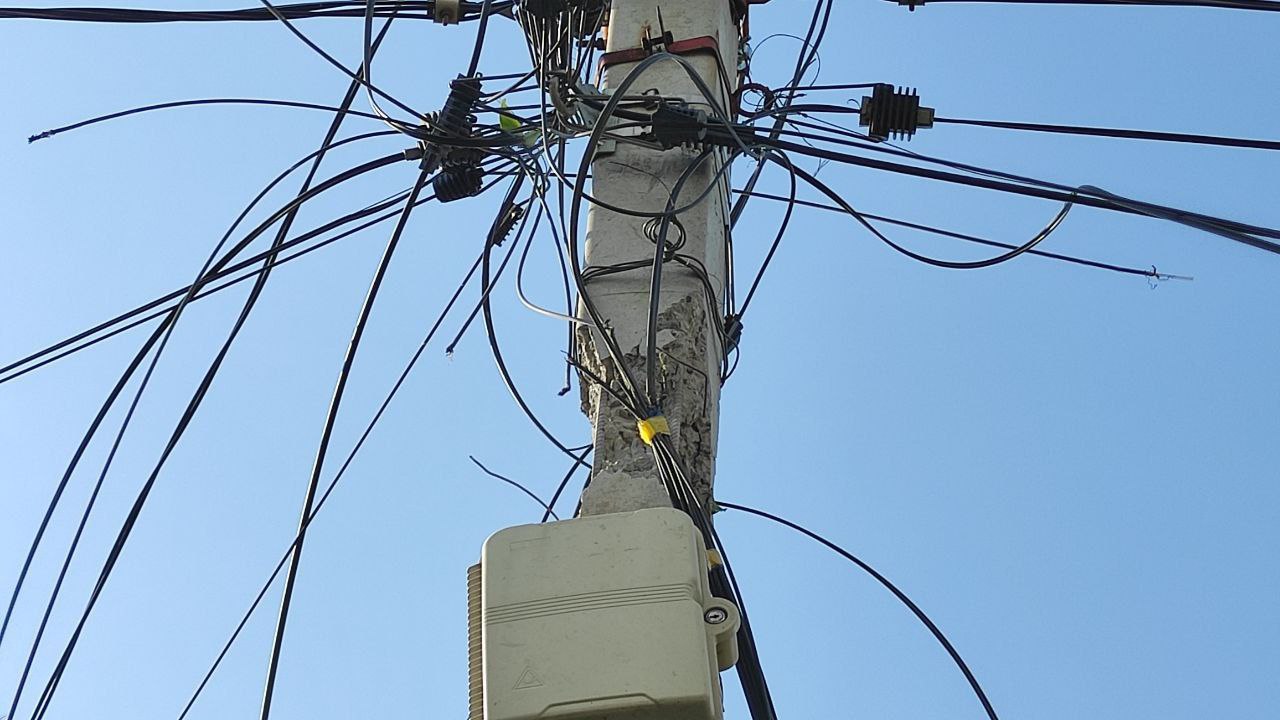
“The EUR 10,000 that LLC “NEON” received as part of the grant support is a large sum for small-sized enterprises like ours. For our business, we need to constantly invest in the development and maintenance of infrastructure. That’s why the grant turned out to be critically important – without it, the company simply would not have been able to survive in the conditions of war and instability,” says Pavlo Konev, the director of the company.
Today, LLC “NEON” continues to provide services to 2400 customers, adapting to new conditions and providing reliable Internet for permanent residents as well as new residents of the city.
Reference information
Non-reversible financial support (grants) to Ukrainian telecommunication operators in de-occupied territories is provided within the international cooperation project ReACT4UA («Utilization and Implementation of the Association Agreement between the EU and Ukraine in the field of trade»), financed by the German Government and implemented by the German federal company «Deutsche Gesellschaft für Internationale Zusammenarbeit (GIZ) GmbH». The grants were made possible by ad-hoc funding from the German Government. The programme aims to support Ukraine’s economic resilience, recovery and growth, create better conditions for the development of Ukrainian small and medium-sized enterprises (SMEs) as well as support innovation and exports.
The strategic implementer of the programme is the German federal company «Deutsche Gesellschaft für Internationale Zusammenarbeit (GIZ) GmbH». The implementing partner is Better Regulation Delivery Office (BRDO). The support is given by: The Ministry of Digital Transformation of Ukraine.
The contents are the sole responsibility of BRDO and do not necessary reflect the views of the European Union and the German Government.
#eu4business, #MovingForwardTogether, #gizSME
The Better Regulation Delivery Office (BRDO) has launched an analytical dashboard – “The Fixed Internet Access Services Market.” It is the only public interactive tool in the country that aggregates information about the key characteristics of the fixed communication services market over the past three years. The dashboard enables tracking of the main trends and dynamics of the fixed Internet access market of Ukraine. Open data from the NCEC regulator and information about single taxpayers were used to prepare the dashboard.
According to the BRDO analytical dashboard, the Ukrainian fixed Internet access services market in 2024 demonstrates the following indicators:
“We are confident that the BRDO fixed Internet services dashboard will become an important tool for market participants and analysts. The tool was created using open data. Our goal is to enable the release of additional data from the NCEC regulator for a better analysis of the industry,” said Ihor Samokhodskyi, Head of the IT and Telecom sector of the BRDO.
The Top-10 largest companies in the fixed Internet access services market in 2024 are JSC “Ukrtelecom”, PJSC “Kyivstar”, LLC “Volia-Cable”, PJSC “Datagroup”, LLC “NPK ‘Home-Net’”, LLC “Frinet”, LLC “Business and Technologies”, PJSC “Farlep-Invest”, PE “Dykyi Sad”, and LLC “LANET Network”. In the first half of 2024, the market leaders provided fixed Internet access to 33% of Ukrainian subscribers (2.8 million users), generating 28% of the industry’s revenue. At the same time, the market share of the largest operators, both in terms of revenue and subscriber numbers, decreases annually.
During September–October 2024, the State Tax Service (STS) started cancelling the simplified taxation system for fixed Internet access service providers that are small businesses. According to the latest NCEC data, 487 Internet providers have already filed applications to cease their operations. It is worth noting that providers under the simplified taxation system provided Internet access to 41% of all subscribers, including 51% in rural areas. BRDO experts believe that this decision by the STS will lead to a deterioration in service quality, decreased Internet access availability, increased vulnerability of networks to physical and cyberattacks, higher costs of Internet access, and other negative impacts.
The analytical dashboard for the fixed Internet access services market is available via the link on the BRDO website (in Ukrainian).
The analytical work on the study of the fixed Internet access market in Ukraine is made possible by the Digital Transformation Support Project with support from USAID and UK Dev. The implementing partner is the BRDO.
On November 13, 2024, as part of the Data+ communication platform, an online discussion “Addressing the Challenges of Verification and Publication of the Unified State Register of Addresses (USRA)” was held. The event was organized by the Better Regulation Delivery Office (BRDO) in cooperation with the Ministry for Communities and Territories Development of Ukraine, and the Ministry of Digital Transformation of Ukraine, and made possible by the Digital Transformation Activity with support from USAID and UK Dev. The event gathered around 140 participants, including representatives of local councils, government institutions, postal services, educational institutions, civic activists, and experts in the field of open data.
The Unified State Register of Addresses (USRA) is being developed as a single database of all addresses in Ukraine, containing unique identifiers for each object of administrative-territorial structure, street, building, and premise. This solution will facilitate interoperability between electronic systems (both public and private), efficient tax administration and property accounting, counteraction to real estate fraud, as well as improve the work of emergency services, urban development planning, and the provision of convenient administrative services to citizens.
During the implementation of the USRA project, two pilot projects were conducted, involving more than 150 communities. A training course for specialists was developed, and to date, more than 1,700 community specialists have completed training and started work in USRA. Competence Centers have been established in every region to support and advise local authorities. Moreover, Deputy Governors for Digitalization (CDTOs) in all regions of Ukraine have been involved in the project, ensuring effective coordination.
Anatolii Komirnyi, Deputy Minister for Communities and Territories Development of Ukraine – Chief Digital Transformation Officer, emphasized the importance of the USRA project in solving address-related issues in every settlement. He noted that numerous address databases exist without synchronization, which impacts the work of government agencies, emergency services, businesses, and the daily lives of Ukrainians. Therefore, it is essential to create a unified system of verified addresses that all stakeholders can use. Over the past three months, more than 100,000 streets have been verified within the register.
Yanina Liubyva, Open Data Expert at the Ministry of Digital Transformation of Ukraine, noted that publishing USRA as open data would enhance the efficiency of software products and services, allowing the integration of the register into technical solutions. Promoting the opening and use of socially significant datasets is a priority for the Ministry of Digital Transformation of Ukraine. The Ministry will support the publication of USRA as open data and its implementation in digital services.
Nadiya Konashchuk, Head of the Open Data Direction for the “Support for Digital Transformation” (DTA) project, added that two key areas should be highlighted within the USRA project: first, populating the register and verifying data, and second, publishing information as open data. The “Support for Digital Transformation” project advocates the “open by default” principle, when administrators publish open data based on the results of developed electronic systems, and is interested in opening access to address register information.
As of November 2024, 170 communities and 14 large cities have completed the full verification of streets, representing more than a quarter of all addresses nationwide. Communities, excluding those in conflict zones or temporarily occupied territories, are participating in the verification process. The most active participants in the USRA project include communities from Lviv, Rivne, and Vinnytsia regions.
By the end of 2025, the goal is to verify 100% of streets and addresses at the local government level, prepare open datasets, and configure APIs to ensure interaction with all basic registers and information-communication systems.
During the event, experts discussed key aspects of creating and populating the Unified State Register of Addresses, issues of further verification and data publication, as well as the next steps for expanding access to information.
The discussions at the event and the feedback from participants will form the foundation for further stages of data population and verification in the USRA.
We invite you to submit proposals for publishing USRA datasets via the provided link.
The video recording of the discussion on verification challenges and data publication of the USRA is available here.
The Unified State Register of Addresses is developed with the support of the Ministry of Communities and Territories Development of Ukraine and the Ministry of Digital Transformation of Ukraine and made possible by the Digital Transformation Activity with support from USAID and UK Dev. East Europe Foundation is the implementing partner of DTA for the Unified State Register of Addresses.
The Data+ communication platform was developed by the Ministry of Digital Transformation of Ukraine and by the Digital Transformation Activity with support from USAID and UK Dev. The implementing partner is the BRDO.
The LLC “Zviazkovyi” is a Boryspil-based Internet provider that provides services to households and businesses in the Kyiv region. The company employs 19 people, including certified specialists in optical network construction and network administration.
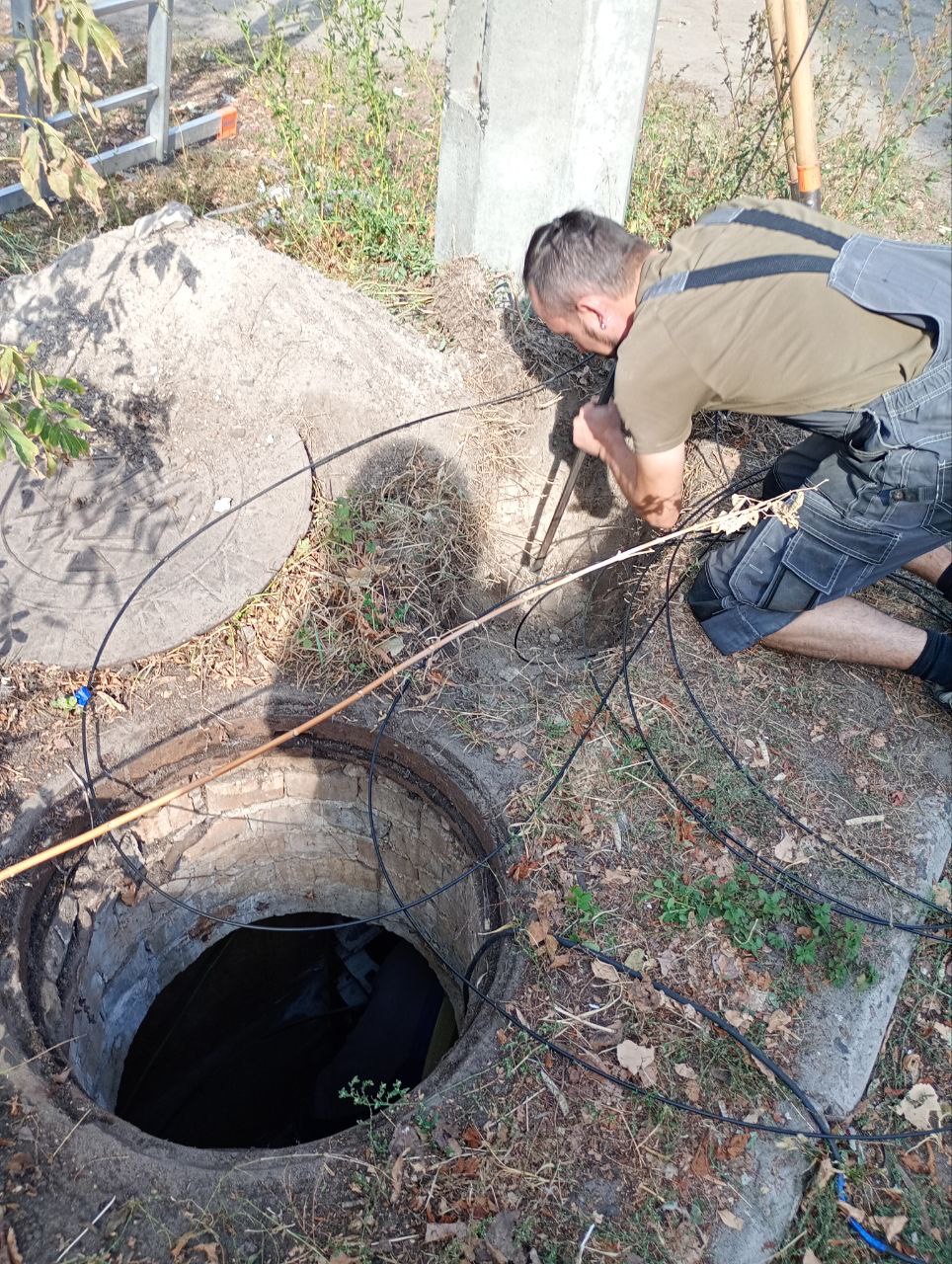
Before applying for the grant, the company’s team held an internal discussion. The main goal was to create a project that would not only be of public benefit but would also help improve the reliability of communication for people and businesses in the de-occupied territories. At a time when the energy infrastructure was constantly being destroyed and mobile operators stopped providing internet after a power outage, the question became especially acute: how could people continue to work, study and exchange information?
The team of LLC “Zviazkovyi” decided that the company’s project should be aimed at building an optical fibre network in one of the de-occupied settlements in Kyiv region, where it already provides services. They chose the village of Baryshivka in Brovary district of Kyiv region with a population of over 10,000 people.
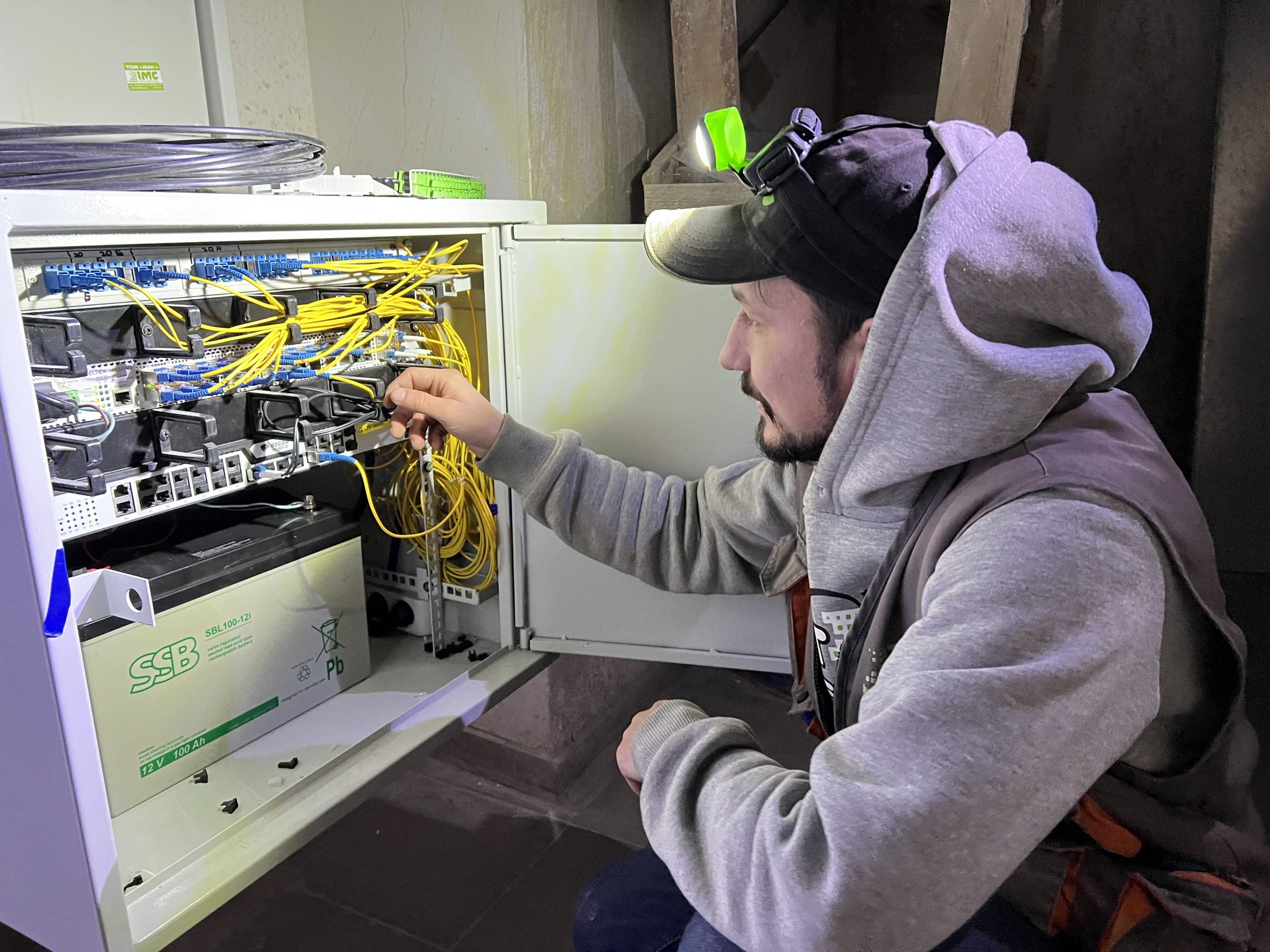
Before receiving the grant, the LLC “Zviazkovyi” temporarily suspended network expansion and connection of new homes. The main financial resources had to be spent on purchasing batteries, generators and fuel to ensure uninterrupted service for existing subscribers. The company also postponed spending on staff training and professional development. Marketing and advertising activities had to be significantly reduced.
By participating in and winning a grant competition under the ReACT4UA programme funded by the German government and implemented by the German federal company “Deutsche Gesellschaft für Internationale Zusammenarbeit (GIZ), the LLC “Zviazkovyi” was able to expand its coverage as high-speed internet services based on fibre-optic technology became available to residents of 19 apartment buildings in the village of Baryshivka, which was de-occupied in March 2022.
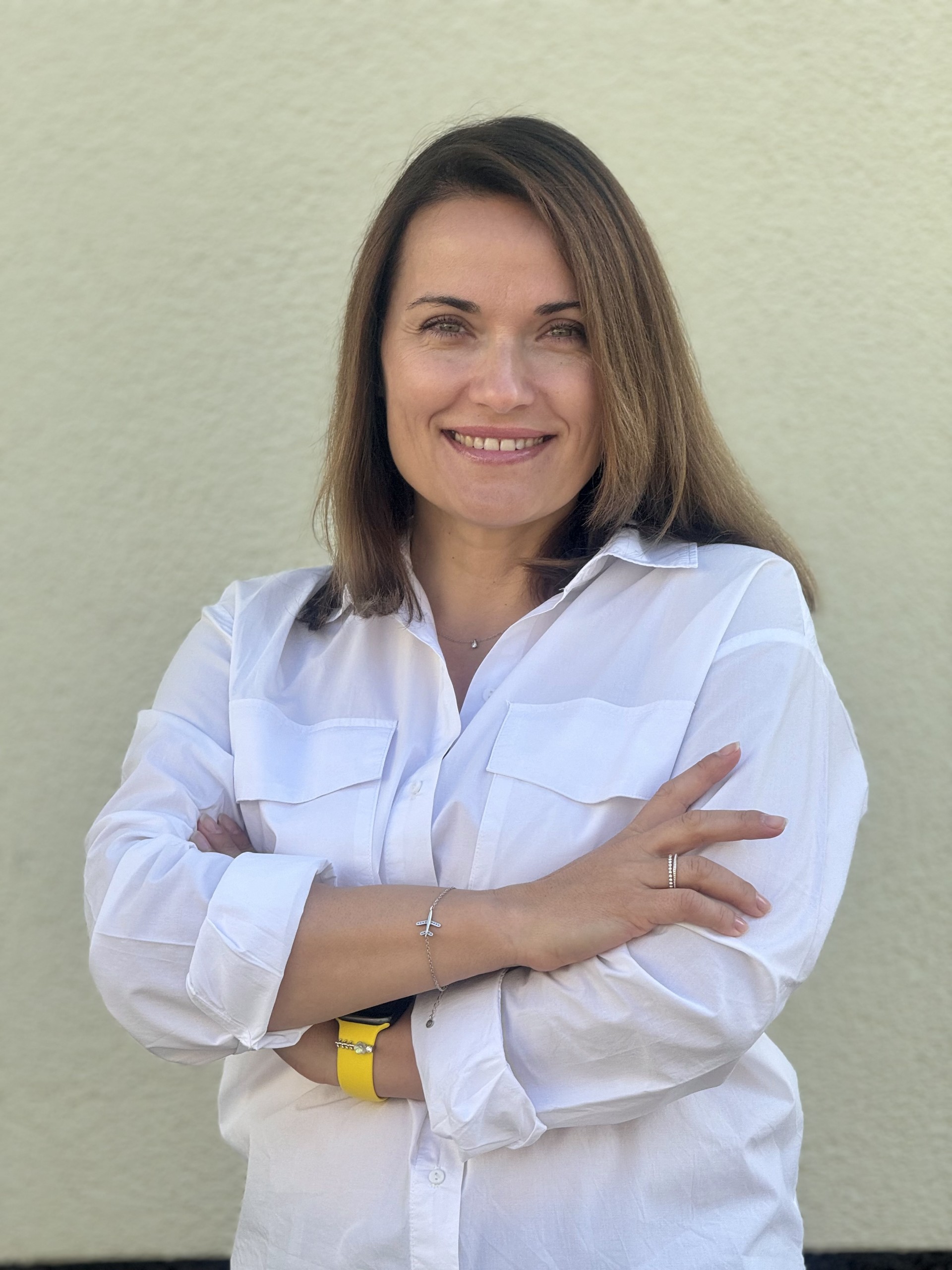
In addition, the company managed to ensure the network’s resilience during power outages. After the implementation of the project, the network’s battery life increased to 72 hours, which is critical in a time of war. When mobile communications become unstable due to power outages, the fixed internet remains the only reliable means of receiving information.
The project also gave impetus to the company’s development despite the economic instability caused by the war. Employees were trained and upgraded their skills, enabling the company to be competitive, participate in more complex projects, and attract new customers.
“As the CEO of company, it is very important to me that the ReACT4UA program emphasizes the support of female managers and entrepreneurs in the field of Internet services providers. This field has traditionally been considered “male”, and thanks to such support programs, the role of women in the industry is better highlighted and new opportunities are created for their participation in business”, says Iryna Kabala, CEO of LLC “Zviazkovyi”.
Reference information
Non-reversible financial support (grants) to Ukrainian telecommunication operators in de-occupied territories is provided within the international cooperation project ReACT4UA (“Utilization and Implementation of the Association Agreement between the EU and Ukraine in the field of trade”), financed by the German Government and implemented by the German federal company “Deutsche Gesellschaft für Internationale Zusammenarbeit (GIZ) GmbH”. The grants were made possible by ad-hoc funding from the German Government. The programme aims to support Ukraine’s economic resilience, recovery and growth, create better conditions for the development of Ukrainian small and medium-sized enterprises (SMEs) as well as support innovation and exports.
The strategic implementer of the programme is the German federal company “Deutsche Gesellschaft für Internationale Zusammenarbeit (GIZ) GmbH”. The implementing partner is Better Regulation Delivery Office (BRDO). The support is given by: The Ministry of Digital Transformation of Ukraine.
The contents are the sole responsibility of BRDO and do not necessary reflect the views of the European Union and the German Government.
#eu4business, #MovingForwardTogether, #gizSME
As part of an initiative to decriminalise pornography in Ukraine, the Better Regulation Delivery Office (BRDO) is launching the “Pornbarometer” project. This is a series of analytical materials presenting data on the prosecution of Ukrainians for the creation, distribution, and sale of pornographic materials under Article 301 of the Criminal Code of Ukraine (CCU). With a coalition of civil society organisations, BRDO developed Draft Law No. 9623, proposing amendments to Articles 301 and 302 of the CCU. However, the document has been under review by the Committee on Law Enforcement Activities of the Ukrainian Parliament for over a year.
The first “Pornbarometer” report analyzes the activities of law enforcement agencies over the first three quarters of 2024 regarding criminal prosecution for involvement in adult content creation or distribution. In nine months, 1,104 indictments were filed in court—75% more than in the same period in 2023.

“More than a year has passed since the draft law on decriminalizing pornography was submitted, yet the persecution of Ukrainians continues: criminal cases are being initiated, and verdicts are being handed down. By launching the “Pornbarometer”, we aim to draw public attention to this issue once again. The criminalization of pornography in Ukraine is an outdated relic that does not align with modern realities or the practices of EU and US countries,” commented Ihor Samokhodskyi, Head of the IT and Telecom sector of the BRDO.
Only a small part of the criminal cases end with a court verdict. In 90% of recorded offenses under Article 301 of the CCU in 2023-2024, suspects were identified, yet only 7% of these cases resulted in convictions. According to BRDO experts, the reasons for such low effectiveness of the instruments available to the state may be corruption, “implementation of the plan” by the article to improve statistical indicators, the reluctance of suspects and accused to enter into a plea agreement with the prosecutor, etc. Additionally, overburdened courts and staff shortages lead to delays in case reviews, reducing the share of cases that result in verdicts.

In the first nine months of 2024, Ukrainian courts issued 43 guilty verdicts under Article 301 of the CCU. Ukrainians have been convicted for content shared in private messages, photos posted on dating sites, and content on the OnlyFans platform, which paid $1.27 million in taxes to the state budget last year. Typical cases reviewed by Ukrainian courts include:
Details of other verdicts under Article 301 of the CCU in 2024 can be found at the provided link.
BRDO experts argue that, during a full-scale war, it is inappropriate to allocate law enforcement resources and budgets to prosecuting individuals for actions that pose no public threat. Resources should instead focus on investigating serious crimes, such as child exploitation or human trafficking, rather than criminalizing private Telegram messages or photos on dating sites.
BRDO and a coalition of over 25 civil society organizations oppose criminal prosecution for the creation, distribution, and sale of pornographic materials. Draft Law No. 9623, developed by the coalition to partially decriminalize Article 301 of the CCU, has been under review by the relevant Verkhovna Rada Committee on Law Enforcement Activities for over a year. It is important to note that Draft Law No. 9623 does not decriminalize child pornography, distributing pornography among minors, public display of pornography, human trafficking, or sharing pornographic content without consent.
More news on the decriminalization of pornography in Ukraine:
‘My body, my business:’ Ukrainian lawmakers move to legalize pornography
Decriminalization of pornography: how international organizations support the process
Individual Entrepreneur Serhii Ostapenko has been providing internet services since 2005. Despite all the challenges, he managed to build a resilient network covering the city of Sumy and nearby villages. His customer base grew to 4,000 subscribers, most of whom were rural residents, particularly elderly people, for whom a stable connection was critically important.
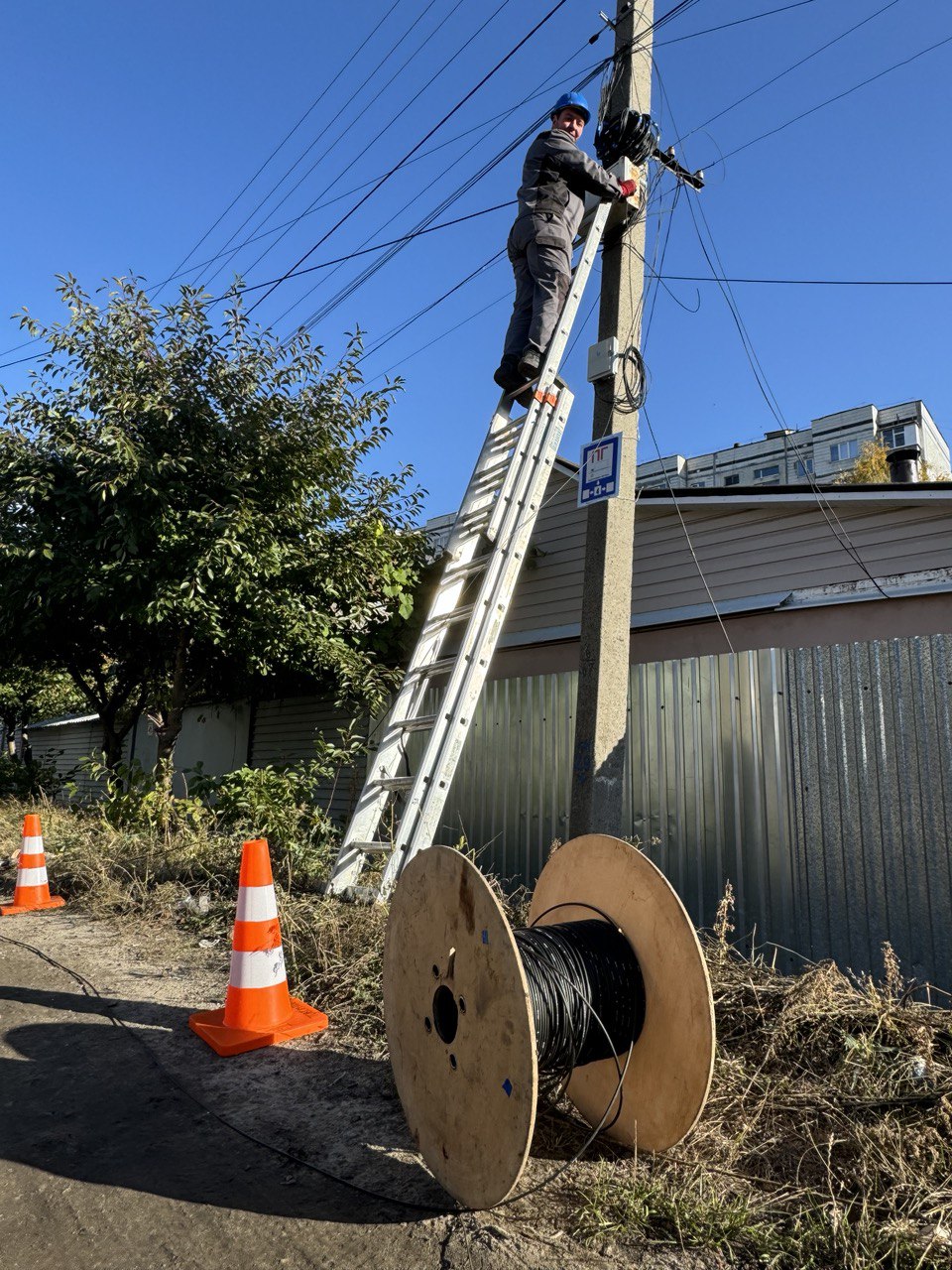
With the development of technologies such as FTTH and later xPON, the enterprise’s network began to reach a new, more modern level, allowing the services to be provided even more reliably and efficiently. However, with the onset of the full-scale war in Ukraine, the situation changed dramatically and the company faced new challenges.
Amid the fighting and occupation, Serhii made the decision in March-April 2022 to suspend service fees for all users of his network. This allowed people to stay connected for free, even when mobile operators ceased operations or access to other communication sources was limited. People who remained connected to the network could communicate with their loved ones and receive essential information during this extremely difficult time for the country.
After reinstating service charges, the company continued to operate with the primary goal of providing uninterrupted internet access to all its subscribers, even in cases of power outages, when traditional communication channels were unavailable.
Thanks to grant support within the international cooperation project ReACT4UA, financed by the German Government and implemented by the German federal company “Deutsche Gesellschaft für Internationale Zusammenarbeit (GIZ), a modernization of the network using the latest GPON technology was made possible. It not only improved the quality of internet services but also ensured stable connectivity, even under the challenging conditions of frequent power outages. Thanks to the grant support the company purchased necessary equipment, including an OLT BDCOM GP360016 switch, optical modules, and terminals for users, making it possible to implement modern technology in areas where other communication means simply did not work.
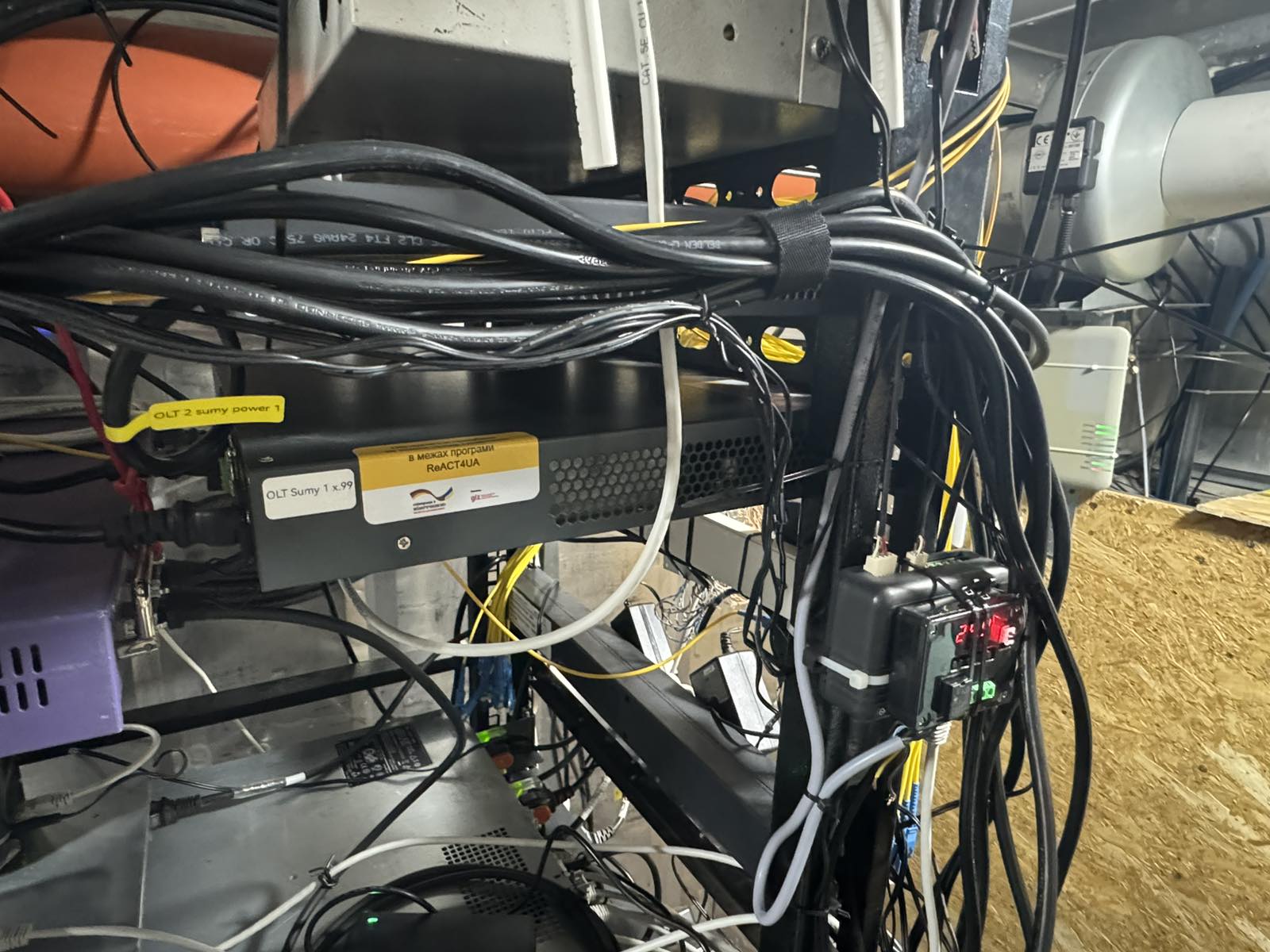
In addition to technical upgrades, the grant support enabled the creation of two new jobs for employees. The new staff underwent training in Kyiv on optical networks and xPON technologies knowledge and practice. This not only ensured a professional approach to modernization but also strengthened the company’s technical team. The grant also helped support the payment of salaries for existing employees for two months, which was crucial for maintaining the company’s workforce.
“I did not expect such support in these difficult times. Ukrainian entrepreneurs are working at the limit of their capabilities, especially those who continue to provide services in frontline areas. It is important to me that people can stay connected, find out if their relatives are safe, and avoid the terrible sense of uncertainty that so many Ukrainians face today. Support like this is crucial not only for businesses but also for achieving long-term results. They allow us to move forward and implement upgrades that would be almost impossible to achieve on our own,” Serhii shares his thoughts.
Reference information
Non-reversible financial support (grants) to Ukrainian telecommunication operators in de-occupied territories is provided within the international cooperation project ReACT4UA (“Utilization and Implementation of the Association Agreement between the EU and Ukraine in the field of trade”), financed by the German Government and implemented by the German federal company “Deutsche Gesellschaft für Internationale Zusammenarbeit (GIZ) GmbH”. The grants were made possible by ad-hoc funding from the German Government. The programme aims to support Ukraine’s economic resilience, recovery and growth, create better conditions for the development of Ukrainian small and medium-sized enterprises (SMEs) as well as support innovation and exports.
The strategic implementer of the programme is the German federal company “Deutsche Gesellschaft für Internationale Zusammenarbeit (GIZ) GmbH”. The implementing partner is Better Regulation Delivery Office (BRDO). The support is given by: The Ministry of Digital Transformation of Ukraine.
The contents are the sole responsibility of BRDO and do not necessary reflect the views of the European Union and the German Government.
#eu4business, #MovingForwardTogether, #gizSME
Starting from October 31, Ukrainian entrepreneurs can apply applications for an extension of the deadlines for foreign currency payments in international trade online. The service is currently available in the ePermit system in beta version, and the main launch is scheduled for December 2024.
How to join the testing?
The first 100 entrepreneurs can test the service on the Diia portal by participating in beta testing!
Why is it important?
Entrepreneurs will be able to submit applications online without having to visit government agencies or banks. Automatic verification of data in the system will allow correcting errors in applications in a timely manner, reducing the risk of delays, fines and account blocking.
What is BRDO’s role?
The Better Regulation Delivery Office (BRDO) joined the launch and support of ePermit through developing the concept, advocacy, and preparation of regulations, including:
The launch is part of the ePermit project, implemented by the Ministry of Economy of Ukraine in partnership with the Ministry of Digital Transformation of Ukraine funded by the European Union under the EU4DigitalUA project, implemented by FIIAPP.
Advisory support for the development of regulations for the system is provided by the EU4Business: SME Policies and Institutions Support (SMEPIS) project implemented by Ecorys in a consortium with GIZ, BRDO and Civitta with the financial support of the European Union.
The business analysis and modernization of the Diia.Business portal to provide the service of issuing a conclusion is implemented by the Digital Transformation Activity with support from USAID and UK Dev. The implementing partners are the BRDO and the East Europe Foundation.
The value of open data in Ukraine is growing, as it is an effective and irreplaceable tool in many areas of activity. Already today, thanks to access to data, Ukrainians are able to monitor potential corruption risks, analyze trends, produce research, and make decisions for their businesses.
In the summer, the BRDO team and partners launched an online survey of open data users to assess their level of satisfaction and the need for additional information. Accordingly, most respondents use the data to prepare analytics and research, as well as to develop products and services for external users. However, many more datasets remain inaccessible to a wide audience in the form of open data, which is a key challenge for this area.
What are the results of the study?
Additionally, the survey was aimed at collecting suggestions from open data users on the development of the sphere. Thus, the proposals of the respondents can be divided into two blocks, concerning the Open Data Portal and the sphere in general.
What should be done to improve the Open Data Portal?
How to improve the open data sphere in general?
As part of the open data initiatives, the development of the Data+ communication platform continues, which has become a platform for discussing important news, disseminating information and interacting with participants – NGOs, activists and government officials. Thus, virtually all respondents are ready to participate in the work of the Data+ platform, and half of them are ready to be regular participants of the platform.
The key results of the survey of open data users can be found on the BRDO website in short and extended forms.
The survey was conducted with the assistance of the Ministry of Digital Transformation of Ukraine and the Digital Transformation Activity with support from USAID and UK Dev. The implementing partner is the Better Regulation Delivery Office (BRDO).
Critical Raw Materials, or CRM, are minerals that are strategically important for the functioning of the EU economy, particularly for sectors such as energy (including renewable energy), aerospace and defense industries, telecommunications, medicine, and pharmacology.
Deposits of these materials in the EU are insufficient to meet internal needs. As a result, the EU is forced to import them mostly, which carries certain risks, such as the unreliability of suppliers, and the economic security of the entire European region depends on it.
To mitigate the risks associated with the import of critical raw materials and ensure the sustainability and continuity of the EU economy, the European Commission has approved a draft Regulation on the Sustainable Supply of Critical Raw Materials to the European Union (Critical Raw Materials Act). This document outlines a range of measures to diversify supply sources, developing internal resources, and creating conditions for strategic partnerships with countries that possess significant reserves of critical raw materials.
What does Ukraine have to do with it?
Ukraine has significant mineral resources. In particular, out of the list of 34 minerals critical for the EU, 28 of them are found in Ukraine. This highlights the strategic importance of our country as a partner for the EU in the context of reducing its dependence on Russia and China.
The availability of mineral deposits creates opportunities to strengthen Ukraine’s cooperation with the EU: we can become a reliable strategic partner in the field of critical materials, their processing products, and finished products needed by strategic sectors of the EU economy. This will not only facilitate the introduction of advanced technologies in both Ukraine and the EU, but also stimulate economic growth and sustainable development for both parties.
What is the BRDO’s achievement?
During 2021-2023, the BRDO team has actively worked on improving Ukrainian legislation in the field of critical materials and aligning it with EU requirements and standards. As part of this work, we have implemented a number of initiatives aimed at increasing investment attractiveness and ensuring sustainable development of the subsoil use sector, including:
What’s next?
The BRDO team continues to work in the following areas:
Stay tuned for updates on our pages!
The analytical work is conducted with the support of the Digital Transformation Activity with support from USAID and UK Dev. The implementing partner is the Better Regulation Delivery Office (BRDO).
On October 21, 2024, the first event of the GovTech Nights series took place at the MacPaw Space creative space, bringing together over 100 experts from the public, private, and civil sectors involved in digitization.
GovTech Nights has become a platform for sharing experiences, discussing professional challenges and failures, and finding new approaches to solve the problems in the field of digital transformation.
What was discussed?
Special thanks to our speakers, who shared their stories of professional successes and failures and inspired the participants to new achievements in the field of digital technologies:
This event was made possible by the Digital Transformation Activity with support from USAID and UK Dev. The event was co-organized by GovTech company Strimco. We would also like to thank MacPaw Space for providing a creative and technological space for the event.
Stay tuned for announcements of upcoming GovTech Nights events, and see you next time!
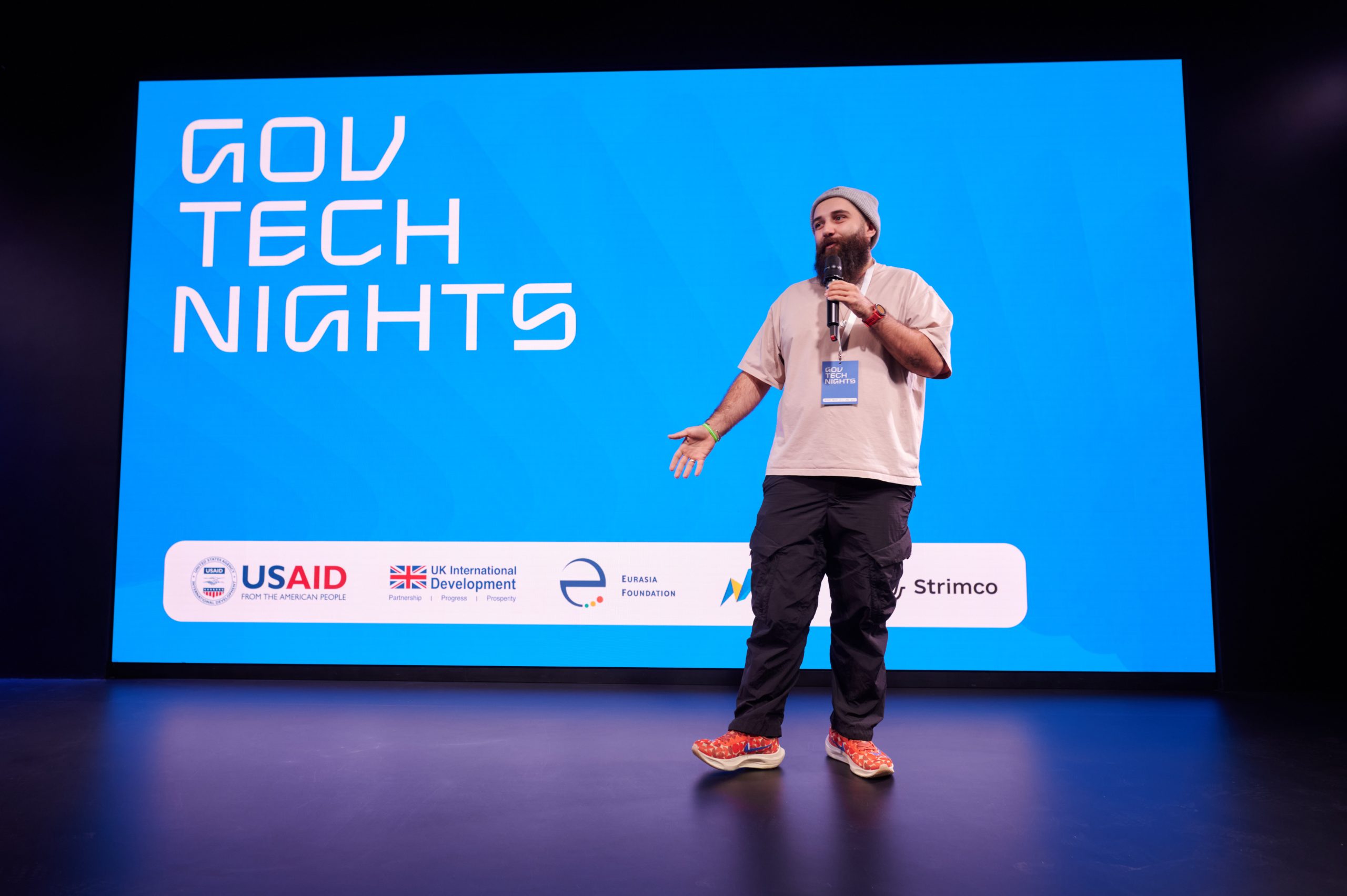



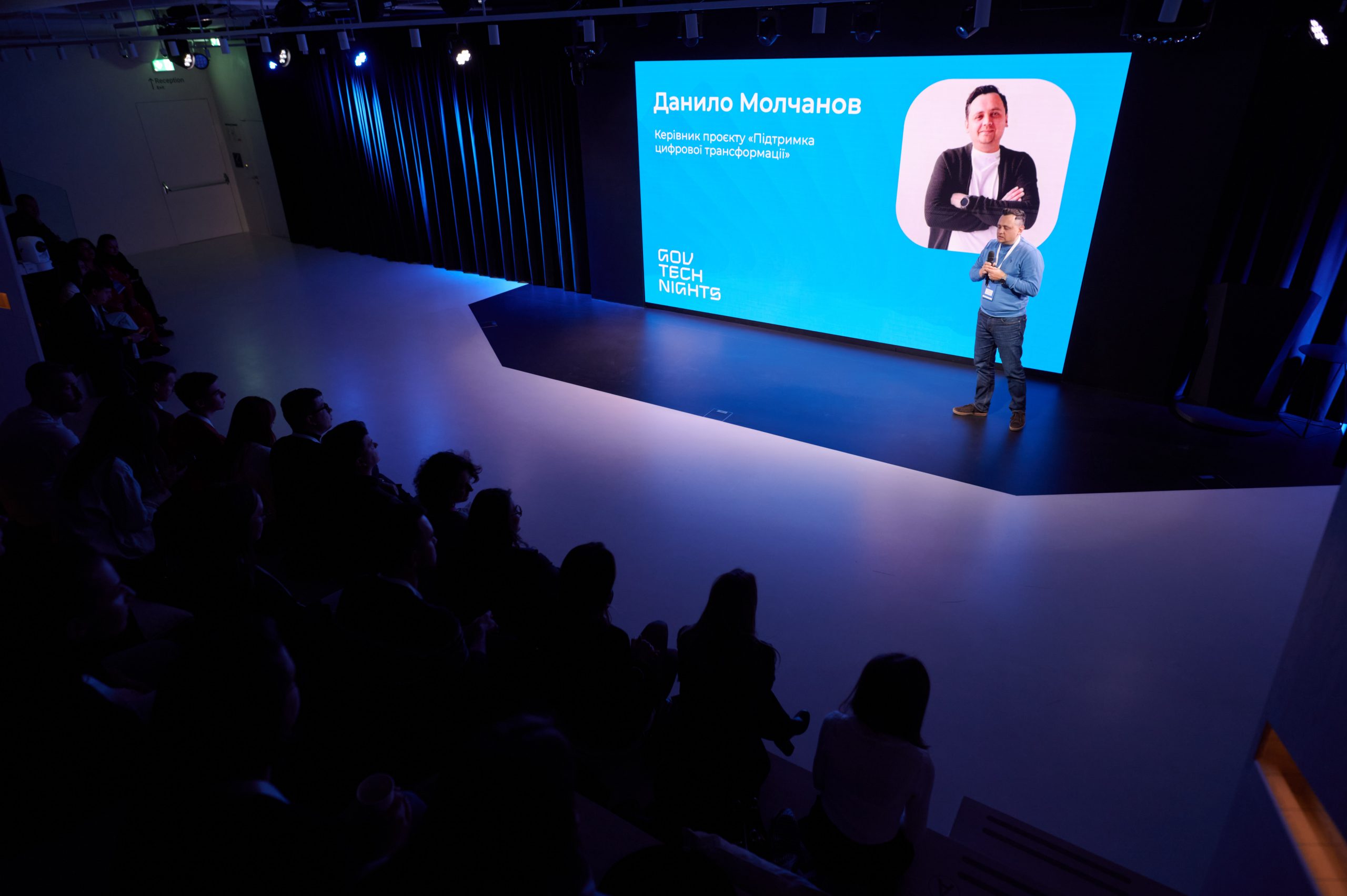



Попереднє
Наступне
On October 15, 2024, a roundtable discussion “Ways to Solve Problematic Issues of Taxation of Internet Service Providers” was held in Kyiv, organized by a number of specialized associations and public organizations that have united and jointly oppose the abolition of the simplified taxation model for Internet service providers ⎼ small businesses in Ukraine. The BRDO was represented at the event by the CEO Оleksii Dorogan.
The State Tax Service has banned the use of the simplified taxation system for small internet service providers starting from October 1, 2024. This decision contradicts the provisions of the Tax Code, the Constitution of Ukraine and the official explanation of the regulator of electronic communications (NCEC). In response, in early October, business associations, NGOs, and think tanks issued a joint appeal to prevent the unlawful abolition of the single tax for small businesses. The relevant petition received 25,000 votes from Ukrainians.
“The single tax for small Internet providers should be preserved. This is not only a requirement of the times, but also a prerequisite for the country’s development on the path to European integration. A single letter from the State Tax Service cannot ban the simplified taxation model for the entire industry. This is a dangerous precedent and a signal to other market sectors. If there are specific abuses, they must be dealt with legally, and the abolition of the taxation system should take place only through changes to the Tax Code,” said Оleksii Dorogan, CEO of the Better Regulation Delivery Office (BRDO).
As of the beginning of this year, about 2,672 Internet access service providers (over 65%) were under the simplified taxation system (single tax). About 3 million private subscribers, institutions and organizations in Ukraine receive broadband Internet access services from providers operating under the single tax system. Small Internet service providers are key to keeping the frontline regions and the de-occupied territories connected, and their stable operation means security for millions of Ukrainians.
“The issue of abolishing the simplified taxation system is being delayed. We have been working on finding effective solutions for more than six months. The worst part is that the process of closing down about five hundred small Internet providers all over Ukraine has already begun, and this is most critical for the frontline regions. The loss of such providers can lead to a lack of access to critical communications, weakening of network resilience and price increases,” Оleksii Dorogan also added.
Representatives of the Verkhovna Rada of Ukraine, the National Commission for the State Regulation of Electronic Communications, Radio Frequency Spectrum and the Provision of Postal Services (NCEC), the State Regulatory Service, as well as representatives of telecom associations, NGOs and businesses took part in the roundtable.
Sergiy Shtepa, Deputy Chairman of the Committee on Digital Transformation, noted the crisis situation with taxation and the unreasonableness of the additional tax burden on small Internet providers. In his opinion, this will lead to monopolization of the market and deterioration of the quality of communication, especially in the run-up to the winter period. The MP emphasized that he is ready to register a relevant draft law to solve the problem of banning the single tax for small Internet access providers if there is a joint decision of the industry and support from the Ministry of Digital Transformation.
Oleksandr Fediyenko, Chairman of the Subcommittee on Cyberspace Security, noted that the issue of taxation changes is political in nature. He emphasized the importance of SMEs for the Ukrainian economy, as it is primarily the work of small providers that provides connectivity in the frontline areas. However, according to the most recent data from the National Commission, 487 Internet providers – small businesses – filed applications for termination of operations in August-October 2024 due to the abolition of the single tax. According to the MP, all the actions currently being taken by the State Tax Service should be stopped immediately, otherwise there will be less than ten providers left in the entire market.
Denys Pozdnyakov, Advisor to the Vice Prime Minister for Innovations, Development of Education, Science & Technologies and Minister of Digital Transformation of Ukraine, also drew attention to the urgent need for a relevant legislative initiative for the industry. All government agencies – the Ministry of Finance, the Ministry of Digital Transformation, and the Tax Committee – are in favor of market transparency, as abuse of the simplified taxation system is unacceptable. According to him, the Ministry of Digital Transformation is ready to start working together with the Ministry of Finance on a legislative initiative, as both government agencies are in favor of transparency and stopping the abuse of the simplified taxation system in the telecom market.
Nadiia Kostryba, expert of the Better Regulation Delivery Office, presented the BRDO’s joint efforts with specialized associations to change the legislation on the prohibition of the simplified taxation system. The proposed changes to the law “On Electronic Communications” make it impossible to use the interpretation that is currently used by the tax authorities to prohibit the simplified taxation system for Internet providers. We propose:
The work on developing legislative proposals made possible by the Digital Transformation Activity with support from USAID and UK Dev. The implementing partner is the BRDO.
On October 29, the Better Regulation Delivery Office (BRDO), with the support of the USAID Justice for All Activity, held an online presentation of a comparative study of digitalization of the notary. At the event, the main challenges and prospects for the introduction of electronic notary services, which have become especially relevant due to martial law, were discussed. Representatives of the Ministry of Justice, the Notary Chamber of Ukraine and experts in the field of digital law took part in the event.
The BRDO team has conducted a comparative study of digital and remote services and their legal regulation in European and global countries to assist the Ukrainian government, legal and notary community in implementing balanced and modern solutions to ensure access to notarial services. Despite Ukraine’s success in digitizing public services, the issue of remote access to notary services, in particular through video communication, remains open. Martial law and mass migration have made it difficult for millions of Ukrainians to receive notarial services, as many of them need to be present in person. BRDO experts emphasize that the implementation of remote notarial services is possible subject to cybersecurity and the introduction of additional verification mechanisms.
“6.7 million Ukrainians abroad have limited access to notarial services because they can only receive them through Ukrainian embassies and consulates, which cannot be located in every foreign city or village. In our study, we propose ways to help provide such services in a remote format, which is extremely important in times of war. This will become the basis for determining specific steps in the further development of a comprehensive system of digital notary services,” said Оleksii Dorogan, CEO of the Better Regulation Delivery Office (BRDO).
“While working on the comparative study of digitalization of notary, our team carefully studied the practices of other countries. We analyzed more than 200 sources, sent inquiries to 20 countries, and received detailed responses from four countries where digital notaries are successfully operating: Estonia, Lithuania, Latvia, and France. This gave us the opportunity to explore different approaches to remote notary services, assess legal and technical requirements, and adapt international experience to Ukrainian realities,” said Tymur Mykhailov, the legal expert of the Better Regulation Delivery Office (BRDO).
Key recommendations of the BRDO:
The study shows that the introduction of electronic notaries can significantly reduce the impact of war-related threats, such as the loss of documents and physical destruction of archives. The recommendations of the BRDO are aimed at creating a reliable digital system that will meet the needs of Ukrainians in wartime and facilitate the convenience and accessibility of notarial services.
The full version of the study is available via the link. Please leave your comments, suggestions or remarks on the study by following the link until November 13.
This event was made possible with the support of the American people provided through the United States Agency for International Development (USAID) under the Justice for All Activity.
The LLC “Strumin” provides electronic communication services based on its own fibre-optic network covering all districts of Kharkiv and its suburbs. Its clients include IT companies, government agencies, retail, HoReCa and others. The company’s core business is providing Internet access for businesses and households, building IT infrastructure and maintaining it.
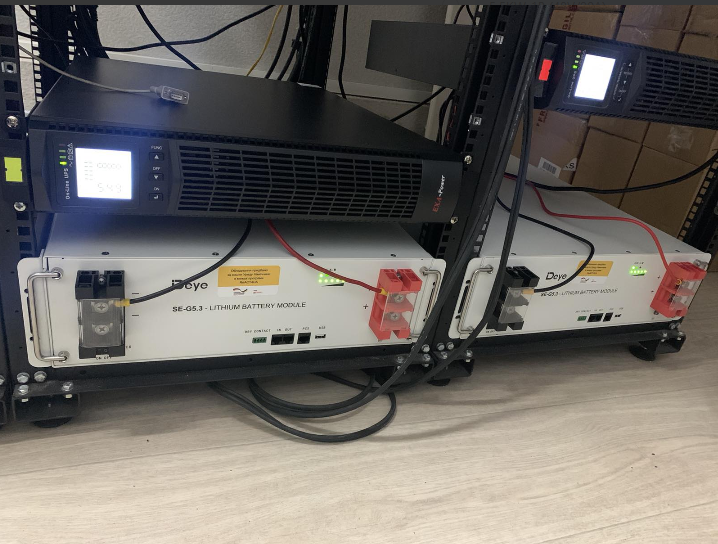 From the very first days of the Russian full-scale invasion to Ukraine on 24 February 2022, the Kharkiv region and the city of Kharkiv came under massive shelling by Russian artillery, which resulted in significant human losses, infrastructure damage and massive displacement of the population. Network construction and restoration specialists had to risk their lives every day in the course of their duties, and the issue of staff safety and job security became the first major challenge for companies providing electronic communications services.
From the very first days of the Russian full-scale invasion to Ukraine on 24 February 2022, the Kharkiv region and the city of Kharkiv came under massive shelling by Russian artillery, which resulted in significant human losses, infrastructure damage and massive displacement of the population. Network construction and restoration specialists had to risk their lives every day in the course of their duties, and the issue of staff safety and job security became the first major challenge for companies providing electronic communications services.
Among the new challenges – large-scale power outages across the country caused by Russian targeted attacks on Ukraine’s energy facilities. This necessitated the search for new solutions to ensure the operation of electronic communication networks in the face of prolonged power outages.
These challenges continued to accompany the LLC “Strumin” during 2023. Limited financial resources had to be allocated between retaining staff, restoring cable infrastructure and upgrading communication hubs using alternative power supply systems. The company has created duty schedules and action algorithms for emergency repair teams in case of line damage and power outages.
To ensure stable operation during long power outages, the company needed modern batteries that could be charged quickly and provide power to equipment for 12-16 hours. This would allow emergency repair teams to reach remote locations in time to charge them using generators.
 By participating and winning a grant competition under the ReACT4UA programme, which is funded by the German government and implemented by the German federal company “Deutsche Gesellschaft für Internationale Zusammenarbeit (GIZ), the LLC “Strumin” bought powerful batteries to ensure the autonomous operation of the central communications hub. Subsequently, the company carried out numerous upgrades to ensure communication sustainability and energy independence. By installing the batteries and adding solar power elements to them, the company was able to save up to UAH 10,000 per month on electricity in the summer and up to UAH 14,000 on fuel for generators during rolling blackouts. With the grant support, 100% of the demand for equipment for the planned modernization of the central node was fulfilled. In addition to direct savings, the company avoided significant costs for transporting generators to remote sites, and emergency response teams were able to focus their efforts on developing the network and connecting new customers.
By participating and winning a grant competition under the ReACT4UA programme, which is funded by the German government and implemented by the German federal company “Deutsche Gesellschaft für Internationale Zusammenarbeit (GIZ), the LLC “Strumin” bought powerful batteries to ensure the autonomous operation of the central communications hub. Subsequently, the company carried out numerous upgrades to ensure communication sustainability and energy independence. By installing the batteries and adding solar power elements to them, the company was able to save up to UAH 10,000 per month on electricity in the summer and up to UAH 14,000 on fuel for generators during rolling blackouts. With the grant support, 100% of the demand for equipment for the planned modernization of the central node was fulfilled. In addition to direct savings, the company avoided significant costs for transporting generators to remote sites, and emergency response teams were able to focus their efforts on developing the network and connecting new customers.
“For a month now, 30% of our regional hubs have not been consuming electricity from the grid. Not because there is no power, but because we have worked with alternative power systems and configured them so that they also work as the main power supplier for equipment and use the battery life only within 10% of their capacity. That is, when the sun is shining or the battery charge is above 90%, electricity from the grid is not used. Thanks to the grant support provided by the ReACT4UA programme, these innovations have become possible,” comments Tetyana Viter, director of the LLC “Strumin”.
Reference information
Non-reversible financial support (grants) to Ukrainian telecommunication operators in de-occupied territories is provided within the international cooperation project ReACT4UA (“Utilization and Implementation of the Association Agreement between the EU and Ukraine in the field of trade”), financed by the German Government and implemented by the German federal company “Deutsche Gesellschaft für Internationale Zusammenarbeit (GIZ) GmbH”. The grants were made possible by ad-hoc funding from the German Government. The programme aims to support Ukraine’s economic resilience, recovery and growth, create better conditions for the development of Ukrainian small and medium-sized enterprises (SMEs) as well as support innovation and exports.
The strategic implementer of the programme is the German federal company “Deutsche Gesellschaft für Internationale Zusammenarbeit (GIZ) GmbH”. The implementing partner is Better Regulation Delivery Office (BRDO). The support is given by: The Ministry of Digital Transformation of Ukraine.
The contents are the sole responsibility of BRDO and do not necessary reflect the views of the European Union and the German Government.
#eu4business, #MovingForwardTogether, #gizSME